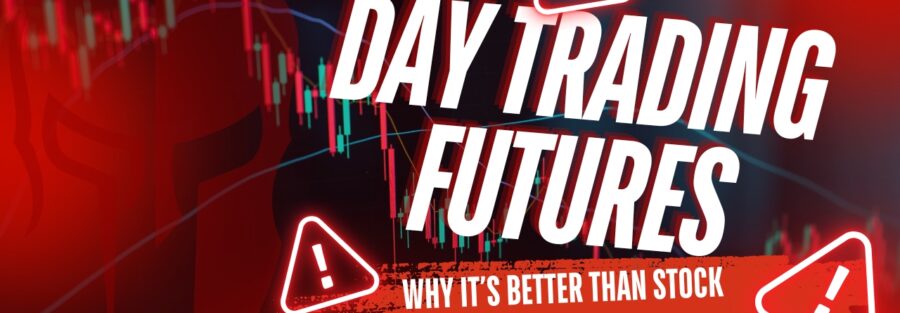Day Trading Futures: Why It’s Better Than Stock Trading for Beginners
If you’re new to day trading, you might be weighing the pros and cons of various markets, from stocks to options to futures. While stock trading is the most commonly known avenue for beginners, day trading futures can offer unique advantages that make it a superior choice for new traders. In this article, we’ll dive deep into the reasons why futures trading might be a better fit for you and guide you through the steps to get started.
What Is Futures Trading?
Before diving into why futures trading is advantageous, it’s essential to understand what futures are. A futures contract is a standardized agreement to buy or sell an asset (like crude oil, gold, or an index such as the S&P 500) at a specific price on a future date. Futures contracts are traded on organized exchanges like the Chicago Mercantile Exchange (CME), ensuring transparency and liquidity.
Unlike stock trading, where you purchase shares of a company, futures contracts involve buying and selling the future price movement of an asset. While futures contracts can result in the physical delivery of a commodity, most traders close their positions before the contract expires, thereby profiting or losing based on price fluctuations.
Futures are ideal for day traders because they offer ample opportunities for short-term trades, driven by both macroeconomic factors and market volatility. But what sets futures apart from stock trading? Let’s explore why beginners might find futures trading to be a more lucrative and flexible option.
1. Leverage: Magnified Potential Returns
One of the primary reasons traders flock to futures is the availability of leverage. Leverage allows you to control a large contract value with a relatively small initial deposit, known as margin. For example, you might be able to control a $100,000 contract with as little as $5,000 in margin.
Leverage can greatly amplify your profits because even a small price movement in the underlying asset could yield substantial returns on your initial capital. For instance, if you control a futures contract on crude oil (symbol: CL), and the price of oil moves by 1%, your profit could be 10% or more due to leverage.
Let’s break it down with an example:
- You control a futures contract worth $100,000 with $5,000 of margin.
- A 1% price increase on the asset value (i.e., $1,000) translates into a $1,000 profit for you.
- That $1,000 profit is a 20% return on your initial $5,000 margin!
But while leverage increases your profit potential, it’s also important to recognize the risk. Just as profits are magnified, so are losses. If the market moves against your position, you could lose more than your initial margin. This is why beginners must employ solid risk management techniques like setting stop-loss orders and trading with only a small portion of their account on each trade.
Learn more about using leverage responsibly:
Investopedia – Margin in Futures Trading
2. Extended Trading Hours: Flexibility for Day Traders
Unlike the stock market, which operates primarily between 9:30 AM and 4:00 PM EST, futures markets trade nearly 24 hours a day, five days a week. For example, popular futures contracts like the E-mini S&P 500 (symbol: ES) are actively traded from Sunday evening until Friday afternoon with only short breaks during the day.
This continuous trading allows day traders to respond to global news and economic events that happen outside regular U.S. stock market hours. For beginners, this flexibility can be crucial. If you have a full-time job or other commitments, you can still trade futures before or after the regular stock market closes.
Moreover, overnight trading often has lower volume and different volatility characteristics, allowing you to test strategies in a less hectic environment compared to the stock market’s opening hours, which tend to be the most volatile.
Explore more about futures trading hours:
3. No Pattern Day Trader (PDT) Rule
In the U.S., stock traders are subject to the Pattern Day Trader (PDT) rule, which restricts traders with less than $25,000 in their account from making more than three day trades in five business days. If you break this rule, your brokerage could freeze your account or limit your trading ability.
Futures trading doesn’t have a PDT rule. This means you can day trade futures with much less capital, often as little as $1,000 to $2,000, without restrictions. This is especially beneficial for beginners, as you don’t need a large account to start trading actively.
The absence of the PDT rule enables traders to focus on developing their strategies and practicing without worrying about account size limitations. With futures, you have the freedom to enter and exit positions multiple times a day, giving you more opportunities to refine your trading skills.
Read more about the PDT rule:
FINRA – Pattern Day Trader Rule
4. Tax Advantages: Section 1256 Contracts
Futures traders enjoy significant tax advantages under Section 1256 of the U.S. tax code. Profits from futures trading are taxed at a 60/40 split, where 60% of your profits are taxed as long-term capital gains (up to a 20% tax rate), and 40% are taxed as short-term capital gains (up to a 37% tax rate).
In contrast, day traders in the stock market typically pay taxes on their gains as ordinary income, which can be much higher depending on your tax bracket. For active day traders, this more favorable tax treatment can lead to substantial savings over the long term.
For example, if you earn $10,000 in futures trading profits, you might only owe $2,440 in taxes under the 60/40 rule, whereas you could owe significantly more on stock day trading profits treated as ordinary income.
Dive deeper into Section 1256 tax rules:
5. Liquidity and Market Volatility: More Opportunities for Profit
Liquidity refers to how easily you can enter and exit a position without affecting the price. Futures markets, particularly for major contracts like crude oil (symbol: CL) or the E-mini S&P 500 (symbol: ES), are highly liquid. High liquidity ensures you can execute trades quickly at your desired price, making it easier to capitalize on short-term movements.
Volatility is another advantage of futures trading. While many view volatility as risky, day traders rely on price fluctuations to generate profits. Futures markets tend to be more volatile than individual stocks, providing more opportunities for profit. The volatility in these markets comes from macroeconomic factors like economic data releases, geopolitical events, and supply-demand changes, making futures prices more predictable for traders who follow the news.
Learn about volatility in futures trading:
The Balance – Understanding Volatility
6. Transparency and Fair Pricing: Market Integrity
Futures markets are highly regulated and operate on centralized exchanges. This ensures price transparency and reduces the chances of insider trading or market manipulation, which can sometimes be an issue with individual stocks. Prices in the futures market are determined by supply and demand, and since they trade on regulated exchanges, participants can trust that the market operates fairly.
For example, a futures contract like the E-mini S&P 500 derives its value from the S&P 500 Index, which is composed of 500 large U.S. companies. This direct correlation makes futures prices easy to follow and predict, especially for beginners.
Check out more about futures market regulation:
How to Get Started with Day Trading Futures
If you’re convinced that futures trading might be a better option than stock trading, here’s a step-by-step guide to help you get started:
1. Choose the Right Futures Broker
You’ll need to open a futures trading account with a broker that supports futures contracts. Look for brokers that offer competitive commission rates, educational resources, and a user-friendly trading platform.
Popular futures brokers include Interactive Brokers, TD Ameritrade’s ThinkorSwim, and TradeStation. Be sure to compare fees and platform features before making a decision.
2. Educate Yourself
Start by learning the fundamentals of futures trading. Understand how margin, leverage, and different contract types work. Many brokers offer educational resources like webinars, articles, and demo accounts where you can practice trading without risking real money.
3. Practice with a Demo Account or Use a Prop Firm
Before diving into live trading, it’s essential to practice your strategies in a risk-free environment. Most brokers offer demo accounts that simulate real market conditions. Use this opportunity to refine your trading approach and develop your risk management skills.
The other way is by using a prop firm. Prop firms are companies that allow you to trade with their capital after passing an evaluation of sort. Check into BLUSKY.PRO! And start your journey with lower risks without using your capital.
4. Start Small
When you’re ready to start trading with real money, it’s crucial to start small. Avoid risking large amounts of your capital on a single trade. A good rule of thumb is to risk no more than 1-2% of your account balance on any given trade.
5. Develop a Trading Plan
A successful trader has a clear trading plan that outlines entry and exit strategies, risk management, and goals. Use technical analysis tools like moving averages, RSI, and MACD to guide your decisions.
Learn more about trading indicators:
TradingView – Technical Indicators
Conclusion
Day trading futures offers numerous advantages over stock trading, particularly for beginners. With higher leverage, extended trading hours, and fewer restrictions, futures provide greater flexibility and profit potential. By starting with a solid foundation in education and risk management, you can use futures to build a successful trading strategy.
For anyone looking to maximize opportunities in a dynamic, fast-paced market, futures trading could be the ideal choice over traditional stock trading.





